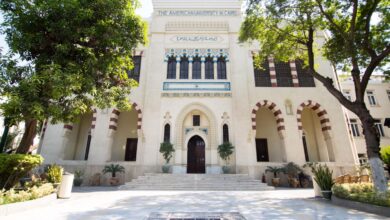Many attempts to document Egypt's 25 January revolution have been made over the past year. The American University in Cairo's Revolution Wiki Dictionary — “Isqat al-Nezam” (or “Deposing the Regime”) — is, however, particularly interesting.
In a seminar last week at the National Translation Center, Khaled Fahmy, chair of the history department at AUC, explained how the initiative started. Two days after Hosni Mubarak resigned, the history department suggested putting together a course entitled “Isqat al-Nizam: Egypt’s 25 January Uprising In Comparative Historical Perspective.” Many students were interested in the course, which examined uprisings in Egypt, Algeria, Palestine, Eastern Europe and Latin America. For their final project, they were asked to write biographical entries on people they believed influenced the January uprising in some way.
Structured as a Wiki, but with rigorous academic documentation of sources, “Isqat al-Nezam” promises a credible source for present and future generations interested in understanding the complex events of the uprising. What began as a new and popular history course has developed into a huge documentation project. And as the revolution continues to change and surprise the world, so does the Wiki. It keeps expanding and developing, updated with entries as recently as March 2012.
But what kind of information does "Isqat al-Nezam" include?
Entries include biographical information on members of the Mubarak regime, government officials before and after the 18-day uprising, "youth of the revolution," bloggers, journalists, prominent writers, activists of various ages, and even presidential hopefuls. And with the click of a button, one gets to learn about these subjects' early lives, education, careers, families, apolitical activities, and roles before and during the revolution. Facebook, Twitter and blogs are linked to in each entry.
Dealing with contemporary history is, however, no easy task. Nareman Amin, a recent graduate of the AUC history department and one of the original contributors to the dictionary, has been working part time on the project since June 2011. Amin's job is what makes the rather raw work of undergraduate students a reliable resource. She edits all entries, seeking quality and consistency, cross-references all the information and keeps adding new entries for personalities who have gained prominence in the intervening months.
The main challenges she faces are finding reliable sources, keeping information relevant with the fast pace of events, and of course overcoming possible biases. At the National Translation Center, she spoke of how dealing with contemporary history has been more difficult than dealing with other periods.
Amin explains that a lack of sources is a major problem sometimes. Many of the figures she needs to gather information on were not previously well-known, so there is limited information available in the public domain. Depending on blogs or interviews becomes an unhappy solution for the problem.
But another major challenge is overcoming biases, even her own. The fact that she has to continually fight her natural inclination toward the revolution made her job editing the entries and answering questions about contemporary events all the more difficult. And as the revolution continues, and the scene keeps changing — sometimes around the clock — the relevance of the huge amount of material becomes another issue. Sometimes, Amin needs to edit previously edited entries to delete material that is no longer relevant.
Amid continued daily uncertainty on the political scene, the AUC Wiki Dictionary of the Revolution comes as a note of hope. As Amin states, "it should help us understand our present better and stay hopeful for a better future."
If you want to access the ever-growing Wiki Dictionary of the Revolution click here.




